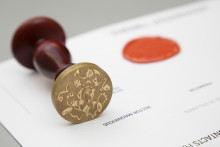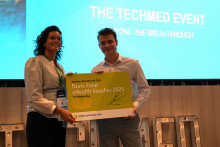Isabel de la Fuente is pursuing a PhD in the Laser Physics and Non-Linear Optics group, in the faculty of Science and Technology under the supervision of Peter van der Slot and Klaus Boller. She studied physics at University of Valladolid. After finishing in 2000, Isabel remained at her alma mater as a research assistant until she found her new career destination in the UT in August 2002.
Her research concerns the use of high frequency and power microwave radiation for industrial application. Microwaves find their application in diverse fields of contemporary science and technology - like chemistry, biology, environmental engineering and, most importantly, material processing of ceramics, polymers, glass and minerals. She says: `Although there exist some microwave sources with desired properties, big size and high price tags put their candidature under a question mark for the industrial investment.' According to De la Fuente, this is exactly where she can chip in - with a device of a non-conventional sort of laser, which makes use of an accelerated electron beam to amplify electromagnetic radiation, resulting in a small, low-priced device.
De la Fuente comes from a small town, Olombrada, in the province of Segovia, which is located in the geographic heart of Spain. She has a brother, who is also doing PhD in Madrid, a city which she is quite fond of. On being asked if she misses her family, `No!!' is the response. But then she quickly explains her curious reaction, `I don't miss home because I call so often.'
De la Fuente recalls her early days when Dutch culture came as a surprise, `Dutch people are very friendly, but very direct as well, and, if you come from a different culture, direct and uncanny reactions can be totally different then what you might be used to. Then I acclimated with the environment, and now I would say I am glad to be here.' One of the things she still misses is a good social life. In Spain, lunches last longer, giving a bit more time to socialize.
Apart from doing research, Isabel likes to dance. Traditional Spanish, salsa, and street dance with hip-hop music make it onto her list of favorites. `In my free time I like to lounge with a good book or some good music.' On the matter of time management, `There is nothing much to see in Enschede, so that is not an issue of concern,' replies the Spaniard with alacrity. De la Fuente is not a big fan of Dutch food and cooks Spanish food occasionally, together with her housemates in Enschede. Cocido, a typical dish from Madrid made of meat and pasta, is what she likes most to prepare.
As for future plans, she says: `I am a spontaneous person and take life as it comes. Sometimes it surprises me how people know so surely what they will be doing in the distant future. Probably I will be in some other country, some other place, you never know.' However, she would like to be happy in life and would not mind having the means for it. She considers teaching teenagers to be a big challenge, because it is very difficult to read their mind. If opportunities arise, she would like to go back to Spain and teach physics to teenagers.
Favorites:
Home town: Olombrada, Spain
Favorite book: Sophie's World by Jostein Gaarder
Favorite film: Lones al sol, Los
Favorite TV program: Myth Busters
Favorite CD: Sabina
Favorite place in NL: Ameland
Dream Destination: Latin America
Best part about living in NL: Tolerance and respect in society
Worst part about living in NL: Lack of sun








